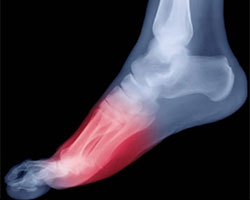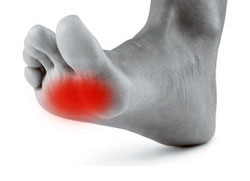- Home
- Foot & Ankle Conditions
- Metatarsalgia (ball of foot pain)
Metatarsalgia: symptoms, causes and treatments
- Published 6/1/2018
- Last Reviewed 5/15/2024

What is Metatarsalgia?
Metatarsalgia often referred to as "ball of the foot pain" or a "stone bruise" is not so much a condition but a general term describing a group of foot problems whose symptoms are caused by several conditions.
In some cases, there can be more than one condition causing metatarsalgia symptoms. This is just one of several reasons why a proper diagnosis can be challenging and why the experience of your doctor is such a critical part of diagnosis and getting a successful treatment plan from the start.
-
Foot and Ankle Surgeon at University Foot and Ankle Institute
Dr. Justin Franson, DPM, is a Board Certified Podiatric Foot and Ankle Specialist and Diplomate of the American Board of Podiatric Surgery. He attended the School College of Podiatric Medicine in Chicago, graduating in 2001. Dr. Franson then accepted a three-year residency program at the Greater Los Angeles VA and UCLA County Hospital.
Dr. Franson specializes in several areas including total ankle replacement and sports medicine. Treating athletes and weekend warriors like himself brings him a lot of joy. Dr. Franson keeps active with running marathons, triathlons, hiking, basketball, and golf.
Metatarsalgia articles from our blog
 I found UFAI after failing traditional treatment for plantar fasciitis in our small town. I did everything suggested, to no ava...Holly B.
I found UFAI after failing traditional treatment for plantar fasciitis in our small town. I did everything suggested, to no ava...Holly B. Good diagnostics and explanation. Both Dr and staff meet my first 5 minute rule.Alvin L.
Good diagnostics and explanation. Both Dr and staff meet my first 5 minute rule.Alvin L. The very Best!Antoinette O.
The very Best!Antoinette O. Very satisfiedJay G.
Very satisfiedJay G. Just Thank you! All is always the best services . Highly recommend.Ingrid F.
Just Thank you! All is always the best services . Highly recommend.Ingrid F. Excellent people. Excellent care.Bradley S.
Excellent people. Excellent care.Bradley S. The personal me trata con respeto mi doctor está tratando de que aser lo mejor para mi perdona graciasArmando T.
The personal me trata con respeto mi doctor está tratando de que aser lo mejor para mi perdona graciasArmando T. 100% satisfiedJames R.
100% satisfiedJames R. Hate these surveys.Rebecca A.
Hate these surveys.Rebecca A. After suffering with a 20 year old ankle injury, I reluctantly agreed to consider PRP treatment. I was very skeptical that I co...Teresa C.
After suffering with a 20 year old ankle injury, I reluctantly agreed to consider PRP treatment. I was very skeptical that I co...Teresa C. I have been suffering from some nasty plantar fasciitis for some years now, and after orthotics and doing my own stretching, I ...Sa W.
I have been suffering from some nasty plantar fasciitis for some years now, and after orthotics and doing my own stretching, I ...Sa W. Dr. Nalbandian provided a good understanding of my options and will follow up in 3 months to see how I am doing and what I shou...William B.
Dr. Nalbandian provided a good understanding of my options and will follow up in 3 months to see how I am doing and what I shou...William B.



